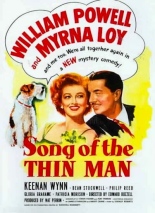
 I was worried, but the Thin Man series ends swell with a jazz-themed return to the formula and the kind of comedy that made the series great. Song of the Thin Man has Nick and Nora back in New York, again trying to solve a murder in order to prove the innocence of a friend. In this case, the friend is Phil Brant, who owns a gambling ship and has an argument with Tommy Drake, who leads the club’s jazz band. When Drake turns up dead in Brant’s office, Nick grabs his cocktail shaker and goes to work.
I was worried, but the Thin Man series ends swell with a jazz-themed return to the formula and the kind of comedy that made the series great. Song of the Thin Man has Nick and Nora back in New York, again trying to solve a murder in order to prove the innocence of a friend. In this case, the friend is Phil Brant, who owns a gambling ship and has an argument with Tommy Drake, who leads the club’s jazz band. When Drake turns up dead in Brant’s office, Nick grabs his cocktail shaker and goes to work.
Instead of Nick drunkenly and good-naturedly suffering the company of snooty rich folk, Song shakes things up a bit by having him drunkenly and good-naturedly suffering the company of hepcats. It’s brilliant, because his reaction to both is nearly identical, but the hepcats are infinitely less irritating (and so, more entertaining) than wealthy snobs. Also, Nora’s even more of a treat than usual once she gloms onto the hepcats’ lingo and starts using it correctly, much to Nick’s befuddlement.
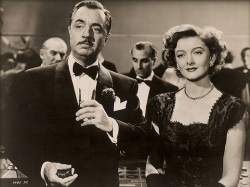 Nick Jr. appears again in this installment, but he’s about 10 or 11 years old and not played for cute anymore. Dean Stockwell (TV’s Quantum Leap) plays him and carries his own as a bona fide member of the wisecracking family. At bedtime one night, he asks for a story. “No story for you tonight,” Nick says, “You’ve got to get some sleep.” Says Stockwell, “But your stories always put me to sleep,” delivering the line almost as perfectly as William Powell reacts to it.
Nick Jr. appears again in this installment, but he’s about 10 or 11 years old and not played for cute anymore. Dean Stockwell (TV’s Quantum Leap) plays him and carries his own as a bona fide member of the wisecracking family. At bedtime one night, he asks for a story. “No story for you tonight,” Nick says, “You’ve got to get some sleep.” Says Stockwell, “But your stories always put me to sleep,” delivering the line almost as perfectly as William Powell reacts to it.
The Thin Man series is famous for presenting marriage as something that people might actually want to do. With Song of the Thin Man, it does the same thing for parenting. —Michael May

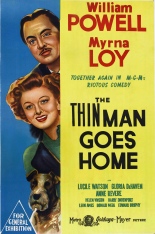
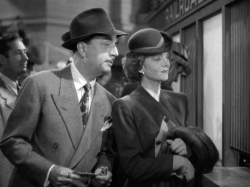 Nick’s best gags have always been his search for the next drink and his drunken endurance of insufferable people. Here, he soberly faces likable people and tries to get them to like him. It’s a sad position for the once great detective to be in.
Nick’s best gags have always been his search for the next drink and his drunken endurance of insufferable people. Here, he soberly faces likable people and tries to get them to like him. It’s a sad position for the once great detective to be in.

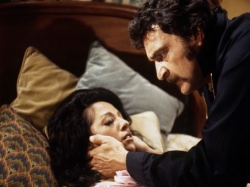 Phillipe is a creepy fool who drunkenly hits on Cousin Lorena; Harriet is a timid housemaid who sees visions of death. Lorena and Andrew quickly form a relationship that may or may not be romantic (I choose “not,” because it allows me to continue judging Phillipe while still liking the two leads), giving this House some appeal that it probably doesn’t deserve. There’s nothing overtly sexual in the way they act around each other; they’re just extremely comfortable in one another’s company and encourage each other in more ways than simply trying to stay alive. There’s a particularly sweet scene where Andrew complains about not knowing anything about himself: “I don’t even know what color I am.”
Phillipe is a creepy fool who drunkenly hits on Cousin Lorena; Harriet is a timid housemaid who sees visions of death. Lorena and Andrew quickly form a relationship that may or may not be romantic (I choose “not,” because it allows me to continue judging Phillipe while still liking the two leads), giving this House some appeal that it probably doesn’t deserve. There’s nothing overtly sexual in the way they act around each other; they’re just extremely comfortable in one another’s company and encourage each other in more ways than simply trying to stay alive. There’s a particularly sweet scene where Andrew complains about not knowing anything about himself: “I don’t even know what color I am.”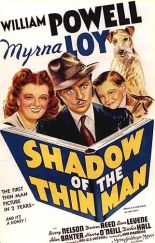
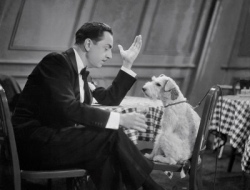 The mystery’s not particularly inspired, either. It has to do with organized crime and betting on sporting events. I yawned just typing that. Nick gets involved because a buddy of his is the prime suspect when someone turns up dead. Barry Nelson, the original James Bond, plays the friend, so that’s cool. And a very young Donna Reed plays Barry’s girlfriend.
The mystery’s not particularly inspired, either. It has to do with organized crime and betting on sporting events. I yawned just typing that. Nick gets involved because a buddy of his is the prime suspect when someone turns up dead. Barry Nelson, the original James Bond, plays the friend, so that’s cool. And a very young Donna Reed plays Barry’s girlfriend.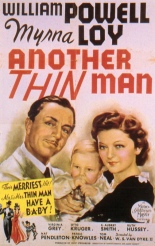
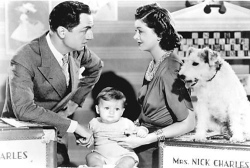 Of course, this being a mystery series, the nanny has a secret past. And it may just be connected to the person who’s threatening the life of the grumpy, old colonel who manages Nora’s money. Since the Colonel doesn’t want the police involved (rich people never want the police involved, making it convenient for the writers), he asks Nick to help.
Of course, this being a mystery series, the nanny has a secret past. And it may just be connected to the person who’s threatening the life of the grumpy, old colonel who manages Nora’s money. Since the Colonel doesn’t want the police involved (rich people never want the police involved, making it convenient for the writers), he asks Nick to help.